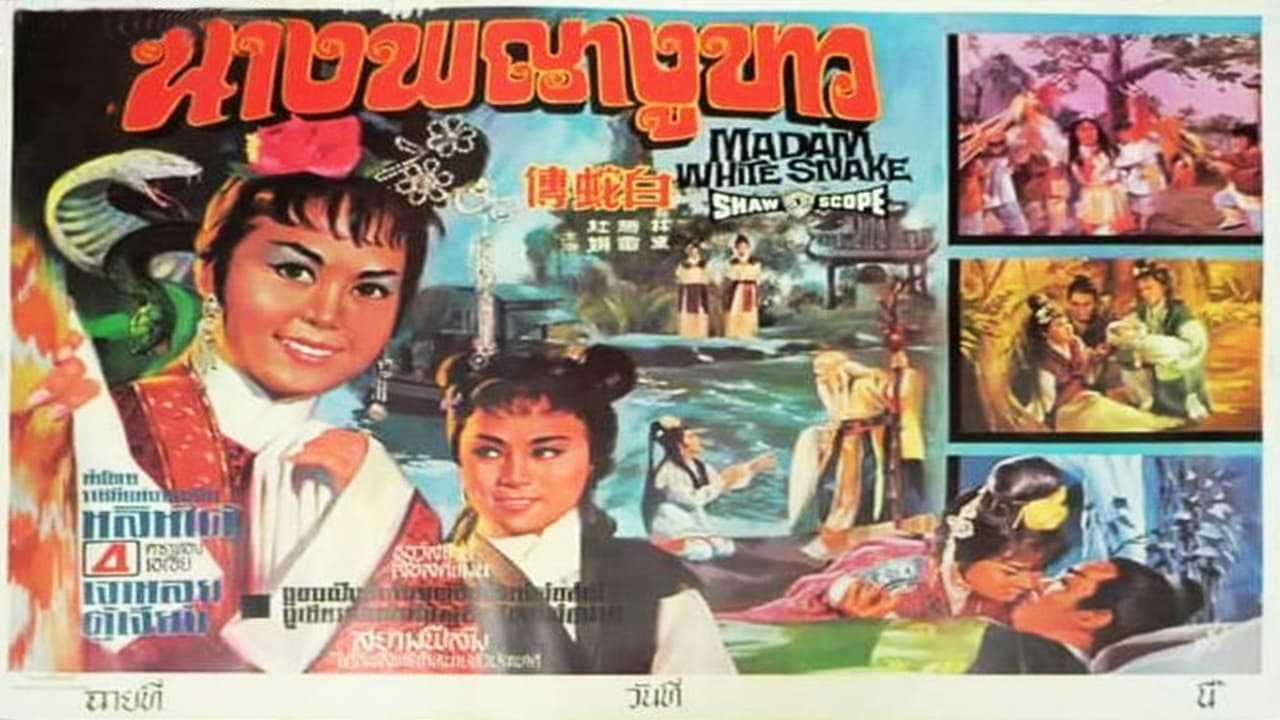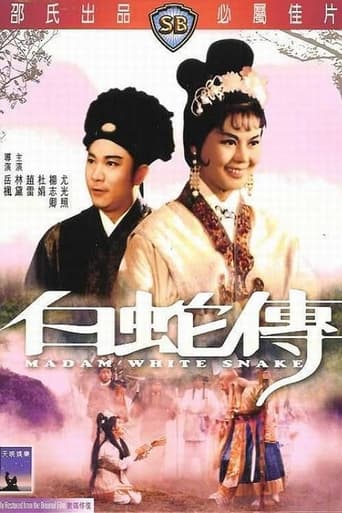



Wonderful character development!
Slow pace in the most part of the movie.
Great visuals, story delivers no surprises
n my opinion it was a great movie with some interesting elements, even though having some plot holes and the ending probably was just too messy and crammed together, but still fun to watch and not your casual movie that is similar to all other ones.
View MoreThis is a classic Chinese tale that has been transformed into a Huangmei Opera, a popular style of Chinese opera and stars Hong Kong beloved actress Linda Dai.The story is a bout two sisters who are centuries old snake spirits who take on human form to find the man that saved White Snake's life. In doing so, Bai Suzhen (Dai) has to romantically involve herself with the man, while maintaining her human form and never letting him know of her true identity. But there are those who know her properly, including a Taoist Priest and a nasty monk and try to warn him, but with her sister they have powers to help the situation. During a festival, her husband insists she drink some potent wine that turns her back into snake, killing him with shock. Only one thing can save him, a special flower, but will the animal spirits let her take it? The film is for the most part sung and the musical style is both fun and enjoyable and at times wonderfully camp. The whole Huangmei style is wonderful, with it's plethora of hand gestures and movements, as well as an array of great eye and facial expressions. It makes for a very light and easy to follow story, even if it does have elements of tragedy throughout. Made in the 1960's, it looks beautiful, with it's colour palate, costumes and sets. Some nifty special effects are also used throughout, some better than others and towards the end there is a truly excellent fight sequence between Bai and the other spirits.The film started to drag towards the end, but I realised as it drew near it's conclusion that I was smiling and had been for most of the film, such was the enjoyment and part of that was due to the occasional singing along from one audience member, of which was made up of older Chinese people, no doubt enjoying the chance to watch one of the many films that Linda Dai starred in before her tragic death when she was only 29. This is a great introduction both to her and to the world of Huangmei, which many of her films are made in.More of reviews at iheartfilms.weebly.com
View MoreMADAM WHITE SNAKE (1962) is yet another version of the oft-filmed tale of two snake sisters, White and Green, who take on human form and live in the human world with White marrying a young scholar, Xu Xian (Chao Lei), and angering a self-righteous Buddhist monk, Fahai (Yang Chi-ching), who vows to drive out the non-humans. This production boasts top-of-the-line Shaw Bros. production values—beautiful color, pretty costumes, elaborate sets, etc.—and is performed in full Huangmei Opera mode, where most of the dialogue is sung. Linda Lin Dai and Margaret Tu Chuan play the snake sisters in highly stylized mode, with lots of formal gestures and movements as if they're overdoing the formality in order to hide their snake origins and appear more human. Things look awfully theatrical at times, as when Lin Dai encounters "celestial spirits" on Mount Kunlun, where she's traveled to get a special herb to revive her husband, and she fights them in a theatrical, almost pantomime manner, complete with stage percussion effects. I found it of academic interest, but not terribly cinematic or exciting.The angry monk, Fahai, normally the chief antagonist in this story, has a curiously shortened role in the proceedings. Not a lot happens in the film, nor is there much suspense. Things come to a halt when the characters start singing to each other. I'm not sure the Huangmei Opera style is well-suited to this particular story, at least on film. It's great for court dramas like DIAU CHARN and THE GRAND SUBSTITUTION and romances like THE KINGDOM AND THE BEAUTY and LOVE ETERNE (THE BUTTERFLY LOVERS), where the characters' emotions and shifts in relations are at the forefront and the lyrics are used to chart the development of characters' knowledge about each other. But a story like WHITE SNAKE needs less singing and more attention to action and special effects, considering the various threats to the snake sisters and Xu Xian. There's a nice shot early on where the sisters magically transform an abandoned estate into something new and sumptuous in order to entice Xu Xian when he visits them. But we really don't get anything comparable until the big special effects finale where the sisters divert the Yangtze River to hit the temple where Fahai and his monks are holding Xu Xian captive. Even then, the miniature effects are not well integrated with the shots with actors, so we never get the sense that the water is actually threatening any of the characters.Having said all that, I should stress that the lead actresses, Lin Dai and Tu Chuan, are both quite beautiful and charismatic and handle the emotional demands of their roles with great skill. They're always a pleasure to behold in these early Shaw Bros. productions. I've seen three other versions of this tale, including a live-action Japanese film (MADAME WHITE SNAKE, 1956), an animated Japanese feature (HAKUJADEN, aka PANDA AND THE MAGIC SERPENT, 1958), and a new wave Hong Kong spectacle directed by Tsui Hark (GREEN SNAKE, 1993). Of these, I find GREEN SNAKE to be the most effective and the most cinematic. It brings out the crucial erotic elements in the story and its lead actresses, Joey Wang and Maggie Cheung, convincingly portray the unique efforts the snake sisters have to make in order to appear human and keep from reverting back to snake form when aroused. It also, surprisingly, closely follows the basic plot of the 1962 version.
View More